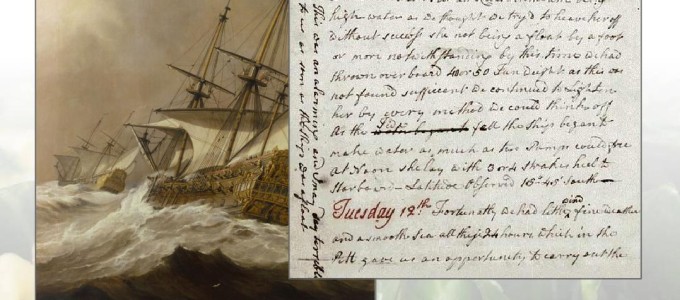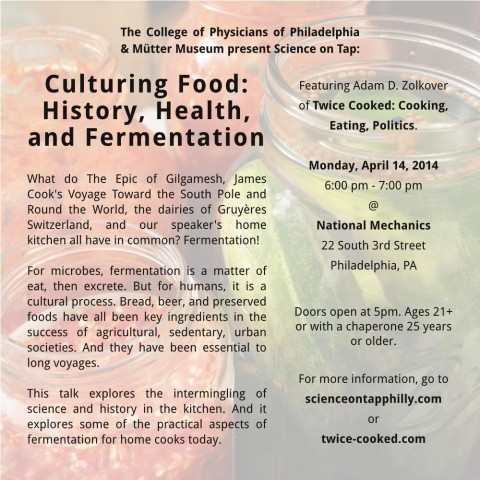Kind of, sort of, you may consider this a follow-up to my previous post about the rhetoric and logic of why people ferment. Two of the folks who I’ve interviewed for this project — one a very old friend, and one a fairly recent one — both had some very interesting observations about why they make pickles, and why other people do too. To a certain degree, they engage with some of the reasons bloggers lay out for pickling — fermentation as tradition, environmental consciousness, health, etc. — but when I said before that those rhetorical moves are far from comprehensive — well — I think you’ll see what I mean. Just read.
Folklore
On the Rhetoric of Lacto-Fermentation Online
If you’re wondering where I’ve been (dear readers!), the answer is otherwise occupied. The past two weeks have been overflowing with grading, and more grading, and a plethora of projects that spread their tendrils like a delicate blue-cheese penicillium into every crack and crevice of my free time. At least one of those projects is food related, however, and based on some research I’ve done for it, here is one observation.
There are a few standard rhetorical moves that food bloggers — including myself — make when introducing lacto-fermentation to their audience:
- The broad call to history and tradition: “This is a technique as old as time itself, that has sustained humanity through its harshest winters when it would otherwise have starved. I want you to feel — FEEL — that connection, people.”
- The call to family history: “This is a wholesome food, and I know it’s wholesome because it’s something that my great grandmother would have eaten with relish.”
- The call to ethnic heritage: “My family is from Lithuania, so when I think of sauerkraut, I think of old men in suspenders, up to their elbows in cabbage, smoking cigars on the porch on Sunday afternoon.”
- The health claim: “I’m no doctor, I’ll admit, but after eating these peachy fermented green beans for a month, the knot in my back unclenched and my singing voice improved!”
- The moral claim: “By doing this, we’re saving the environment and sparing our children from a gut bereft of beneficial bacteria. Won’t somebody please think of the children?”
- The foodie claim: “Michael Pollan
/ Sandor Katz
/ Sally Fallon
/ whoever else all but demand that we ferment!”
- The disclaimer: “I know that this sauerkraut looks funky. But it tastes fun-KAY!” Or: “I swear guys, lacto-fermentation won’t kill you.”
The thing about all of these moves is that while they have their place and while, in a limited way, they describe some of the reasons we ferment, they are not comprehensive. It turns out that folks practice lacto-fermentation for all kinds of reasons. And while health, morality, or tradition may play some role, practical concerns — like the question of what to do when your neighbor gives you a bale of kale — are at least as important. It seems only right that deliciousness and the thrifty thrill of a homemade salty snack often win the day over loftier ideals.
There’s no particular judgment here. Like I said, I have engaged in many of these rhetorical moves, and I stand by the idea (for example) that lacto-fermentation is worth doing because it connects us to our common humanity. But I can’t eat common humanity, whereas I’ve got a great big inviting jar of pickled turnips waiting right over there.
Culturing Food: History, Health & Fermentation
Before we start, here is what you need to know about me. Though this is indeed Science on Tap, and though I was indeed invited here by the College of Physicians, I am neither a scientist nor an M.D. I am a food blogger, a folklorist, a historian, and — if anything — a fermentation enthusiast. This means that what I am interested in is people — how people use fermentation, how they have used it in the past, and how it works as a technology that improves quality of life, and the flavor and longevity of whatever it is folks are eating.
Fermentation is a bit of a popular topic right now. Alternet, the online indy reporting outfit and sometime light-news rag, called it their number one top food trend of 2013. In December of last year, they wrote:
Science on Tap – Culturing Food: History, Health, and Fermentation
Don’t forget, folks — this is happening on Monday, April 14, at 6PM. My talk at Science on Tap. If you’re in Philly, and if you’re around, come on out to the National Mechanics bar on South 3rd St. to hear me talk about fermentation as a science and a technology. There will be pickles! There will be bread! There’s going to be a healthy dose of The Epic of Gilgamesh, and even a little bit of the Bible thrown in for good measure!
(I can talk about the Bible in a science lecture, right? That won’t get me thrown off the stage?)
Anyway: the talk is free. The bar is great. You’ll need to pay for your food and drinks, but National Mechanics does all that stuff super well.
If you come by, say hello. I’d love to meet you.
It’s Time for Wassail
It’s time for Wassail, the celebration of cider and orchards on the 12th Night of Christmas, which according to different calendars can be either the 5th or the 17th of January. This custom, which almost died out in England, happens in the dark period of winter when the nights seem to become interminably long. People bearing torches process into an orchard lit with twelve bonfires representing the twelve months of the year or the twelve apostles. They sing to the trees, scare away evil spirits with gunshots or banging old pans, and share a drink of good health from a communal wassail bowl.
Wassail is an old word from Anglo Saxon meaning “Good Health,” and throughout the celebration, participants frequently shout it with lusty exuberance to toast each other and the health of the orchard. Contemporary wassails often include members of the local Morris group, who lend performances of traditional music and dance, as well as outlandish costume and rowdy humor, to the event.
Salem Witch Trials Memorial
I can imagine you all in my mind’s eye — right now, as I write — tapping your collective foot and looking at your collective timepiece, sighing a collective sigh, and proclaiming in a huff: he’s late!. I can also imagine that you haven’t noticed. Not. At. All. Either way, it’s true. I am late […]
October is the Cruelest Month; or, Beer and Crazies
So where have I been, you might ask, friends of the blog that you all are. I haven’t seen you ’round much, you might say. Have you been avoiding us? Have you stopped writing? Have you cooked at all this week? The answer, dear friends, is that no, I have not abandoned you. But life, […]



